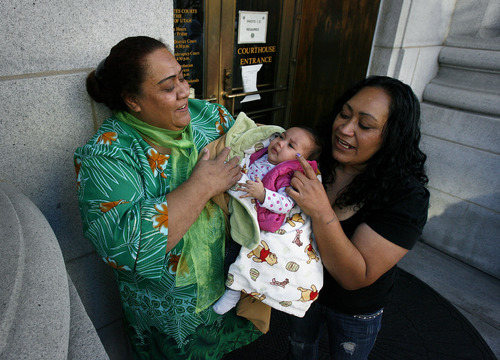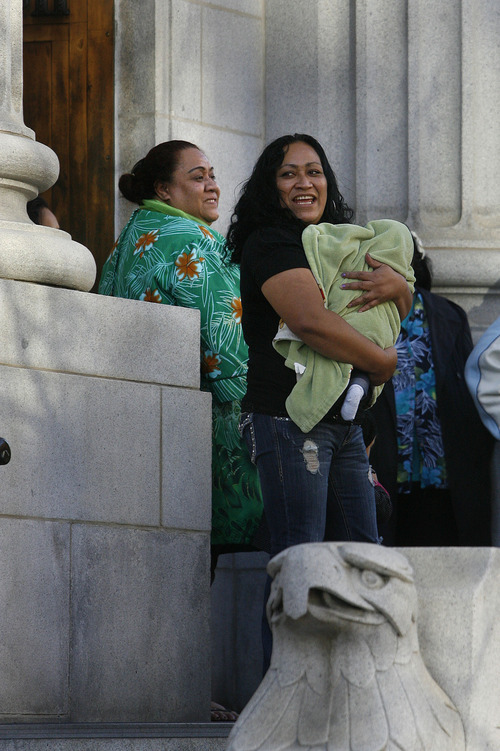This is an archived article that was published on sltrib.com in 2011, and information in the article may be outdated. It is provided only for personal research purposes and may not be reprinted.
All eyes in the jail yard were on David Kamoto.
A game among inmates during recreation time had turned heated and Kamoto had just slammed a ball against the wall out of frustration.
Inmates froze, waiting to see how Kamoto —a member of the Tongan Crip Gang with a reputation for violence —would react as another inmate antagonized him. But an anticipated fight never erupted.
"After a few seconds, I apologized and excused myself," Kamoto, 24, said in a letter to U.S. District Court Judge Tena Campbell. "This experience taught me something, your honor. I am not perfect, nor will I ever be. ... We all have impulses, we just can't act on all of them."
Kamoto's letter to Campbell came in advance of his Thursday sentencing in federal court, where he became the first defendant to be sentenced following the conclusion of an October trial for eight members of TCG, including three men convicted on Racketeer Influenced and Corrupt Organizations (RICO) Act violations.
Jurors acquitted Kamoto on charges related to aiding racketeering, but convicted the man of robbery following a five-week trial. The charge carried the possibility of 46 to 57 months in prison, but following statements from Kamoto and his attorney, Scott C. Williams, Campbell elected to sentence Kamoto to 36 months of supervised release.
"The time you spent in custody is adequate punishment," Campbell said. "To put you away for longer would simply be warehousing you and I think it would have a very negative effect."
In his letter to Campbell, Kamoto called joining TCG as a teenager in 2005 a "mistake" and said he's sorry for crimes he committed on behalf of the gang.
"I know I could never go back, only forward. All I've been through has given me a new profound appreciation for life," Kamoto wrote.
"I'm now more than ever aware of how gangs impact society; how it impacts our victims as well as our families. That being said, I don't want TCG to define the rest of my life. I truly believe the story of David Kamoto has a happy ending. There are a lot of pages left in my book. I humbly ask for another chance to start a new chapter."
Kamoto was arrested as a juvenile in June 2005 for a beer theft at a Taylorsville 7-Eleven that escalated into an assault. The victim, a store clerk, suffered a tear to his earlobe that required stitches and bruising to his neck and head after TCG members hit and kicked him during the robbery.
Kamoto, 17 at the time of the attack, was certified as an adult and stood trial. He pleaded guilty in 3rd District Court to robbery in 2007. He served time at the Utah State Prison until his release on parole in November 2010.
The release was short-lived. A federal judge ordered Kamoto to be kept in custody as the federal RICO case against him proceeded following an indictment handed down in May 2010 to 29 high-ranking members of TCG. Kamoto was among 8 people tried in the case this fall; others have entered guilty pleas or are awaiting trials scheduled for next year.
Because Kamoto already served a state sentence for the robbery he was convicted for in federal court, Williams asked Campbell to order Kamoto to undergo supervised release instead of serving additional prison time for his federal conviction.
Williams said Kamoto has disavowed TCG by warning his siblings to not associate with the gang. He also obliterated gang tattoos on his body and has taken advantage of prison educational and vocational programs.
"While Mr. Kamoto managed to get into plenty of trouble as a juvenile, the fact remains that he was a 17-year-old boy when the [robbery] occurred," Williams argued in court documents. "He is now a young man with a desire to demonstrate that he can leave gang and criminal life behind and be a productive member of his family and society."
Assistant U.S. Attorney William Kendall offered skepticism on whether Kamoto is truly a changed man, reminding Campbell that Kamoto openly admitted his gang affiliations during the October trial, including involvement in a February 2007 shooting outside a Salt Lake City house party that killed 21-year-old Solomone TokoToko Tu'ifua.
Police initially arrested Kamoto in the slaying, but homicide charges were dismissed when it was determined he was not the shooter. New testimony about events surrounding Tu'ifua's murder came out at the October trial, including the accusation that defendant David Walsh, a TCG member from Inglewood, Calif., was the man who fired on Tu'ifua because Tu'ifua had a "beef" with other TCG members — even though all were members of the same gang.
Kamoto had wrote a letter of apology to Tu'ifua's sister a month following the murder, explaining that TCG members had intended to fight Tu'ifua but didn't intend to kill him. Kamoto had his mother, Mary Kamoto, deliver the letter, which he wrote from the Salt Lake County Jail.
"He was clearly involved in the death of Solomone Tu'ifua," Kendall said. "He is a member of TCG and has made no bones about it."
Campbell admitted she worries letting Kamoto back on the street could mean pushing him back into the arms of the gang he supposedly wants to leave behind. But she ultimately granted the request to place Kamoto on supervision, a ruling that garnered quiet cheers in the courtroom from more than a dozen of Kamoto's family members in attendance at the hearing.
"There's no doubt that Mr. Kamoto has been completely living the gang lifestyle," she told Kendall. But, she added, "When people have been punished and [have already] served a long period of time, that must be acknowledged."
She ordered Kamoto to avoid associating with gang members upon his release, but noted that Kamoto can speak with family — including his teenage brother, E.J., a TCG member who testified about the gang's activities during the October trial.
After the sentencing, Kamoto was transported to the Davis County Jail, where the process for his release started. He was scheduled to leave the jail late Thursday or Friday.
Several family members had pleaded to Campbell to give Kamoto a second chance, including the defendant's mother, Mary.
"I know he understands his crime committed and the pain and hurt that has come out of it all," Mary Kamoto told Campbell. "There is no excuse for anything he has done, but I know he has learned from his mistakes and is determined and looking forward to showing the excellent and wonderful character he has to offer society."
Kamoto's letter to the judge offered similar sentiments. He said he would like to work with gang-involved youth in the future to encourage young people to avoid the mistakes that have landed him behind bars for the majority of his adult life so far.
"I know my experiences can reach youth who may be traveling down this dead-end road," Kamoto said.
Twitter: @mrogers_trib —
TCG case recap
A federal jury in October convicted six members of the Tongan Crip Gang (TCG) for crimes dating back to 2002, including robberies, assaults and supporting a criminal enterprise. The verdict came after two days of deliberation and a five-week trial. The defendants face potentially lengthy prison terms when sentenced. Several of the defendants were in the middle of serving other prison terms they will need to carry out before starting their new federal sentences.
Eric "Smooth" Kamahele • 24, of Cottonwood Heights
Convicted of » Racketeering conspiracy; assault with a dangerous weapon in aid of racketeering; using or carrying a firearm during a crime of violence; and robbery. He faces at least 32 years in prison when sentenced Dec. 14.
Mataika "Fish" Tuai • 22, of Salt Lake City
Convicted of » Racketeering conspiracy; robbery and discharging a firearm during a crime of violence. He faces at least 10 years in prison when he is sentenced Jan.11.
David "D-Down" Kamoto • 24, of Salt Lake City
Convicted of » Robbery. Jurors acquitted Kamoto on charges of maiming in aid of racketeering, assault with a dangerous weapon in aid of racketeering; conspiracy to commit assault resulting in serious bodily injury in aid of racketeering; and firearms charges. He faced a statutory maximum of 20 years in prison, although sentencing guidelines suggested a shorter prison sentence of 46 to 57 months. U.S. District Court Judge Tena Campbell on Thursday ordered Kamoto to 36 months of probation.
Daniel "D-Loc" Maumau • 25, of Salt Lake City
Convicted of » Assault with a dangerous weapon and using or carrying a firearm during a crime of violence. Jurors acquitted Maumau on charges of conspiracy to commit assault resulting in serious bodily injury and a second firearms count. He faces at least 10 years in prison when sentenced Dec. 14.
Kepa "Kap-Loc" Maumau • 24, of Salt Lake City
Convicted of » Racketeering conspiracy; robbery; assault with a dangerous weapon in aid of racketeering and multiple counts of using or carrying a firearm during a violent crime. He faces at least 57 years in prison when sentenced Dec. 15.
Sitamipa "Tok-Loc" Toki • 28, of Salt Lake City
Convicted of » Assault with a dangerous weapon and using or carrying a firearm in connection with a crime of violence. Jurors acquitted Toki of conspiracy to commit assault resulting in serious bodily injury and a second firearms count. He faces at least 10 years in prison when sentenced Jan. 11.
David "D-Nutt" Walsh • 32, of Inglewood, Calif.
Acquitted of » Conspiracy to commit assault resulting in serious bodily injury in aid of racketeering. Walsh will be returned to California, where he is serving a prison sentence for crimes there. He may be possibly charged with murder in Utah's 3rd District Court, after previously unrevealed testimony during the federal trial indicated he was the alleged triggerman in the 2007 murder of Solomone Tu'ifua.
Charles "Slim-Loc" Moa • 32, of West Jordan
Acquitted of » Racketeering and weapons charges. The judge ruled there was not enough evidence for Moa's case to be considered by the jury, and granted a defense attorney's motion for acquittal prior to jury deliberations. Moa was sent back to the Utah State Prison in Draper, where he is serving a state prison sentence for 3rd District Court convictions.





